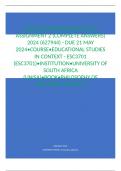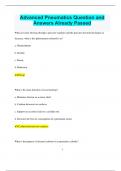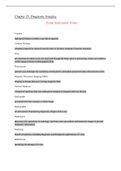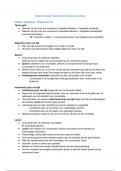EXAM (ELABORATIONS)ESC3701
ASSIGNMENT 2 (COMPLETE ANSWERS)
2024 (627944) - DUE 21 MAY
2024•COURSE•EDUCATIONAL STUDIES
IN CONTEXT - ESC3701
(ESC3701)•INSTITUTION•UNIVERSITY OF
SOUTH AFRICA
(UNISA)•BOOK•PHILOSOPHY OF
EDUCATION TODAY 2E
billclinton tindi
[COMPANY NAME] [Company address]
, Exam (elaborations)
ESC3701 Assignment 2 (COMPLETE ANSWERS) 2024
(627944) - DUE 21 May 2024
Course
Educational Studies in context - ESC3701 (ESC3701)
Institution
University Of South Africa (Unisa)
Book
Philosophy of Education Today 2e
ESC3701 Assignment 2 (COMPLETE ANSWERS) 2024 (627944) - DUE
21 May 2024 ;100% TRUSTED workings, explanations and solutions. for
assistance Whats-App.......0.6.7..1.7.1..1.7.3.9 ..........
QUESTION 1 26 From a sociologic
From a sociological perspective, the function of "activation of constructive and creative
forces" in education refers to the role of schooling in stimulating and harnessing individuals'
innovative and productive capacities within society. This function encompasses several key
aspects:
1. Fostering Creativity: Education provides opportunities for individuals to explore
their creativity and imagination through various forms of expression, such as arts,
literature, and problem-solving activities. By encouraging divergent thinking and
experimentation, schools cultivate an environment where students can develop
innovative ideas and solutions to real-world challenges.
2. Promoting Critical Thinking: Education encourages individuals to critically analyze
information, question assumptions, and evaluate evidence. Through activities like
class discussions, debates, and research projects, students learn to think independently
and creatively, challenging existing paradigms and contributing new perspectives to
societal discourse.
3. Cultivating Entrepreneurial Skills: Education equips individuals with the
knowledge, skills, and attitudes necessary for entrepreneurial endeavors. By fostering
an entrepreneurial mindset characterized by risk-taking, adaptability, and innovation,
schools prepare students to identify opportunities, overcome obstacles, and create
value in the marketplace.
4. Encouraging Social Innovation: Education serves as a catalyst for social change by
empowering individuals to address pressing social issues and inequalities. Through
service-learning projects, community engagement initiatives, and social
entrepreneurship ventures, students learn to apply their knowledge and skills to effect
positive change in their communities and beyond.
Overall, the activation of constructive and creative forces in education is essential for
nurturing individuals' capacity to innovate, problem-solve, and contribute positively to
society. By fostering creativity, critical thinking, entrepreneurial skills, and social innovation,









